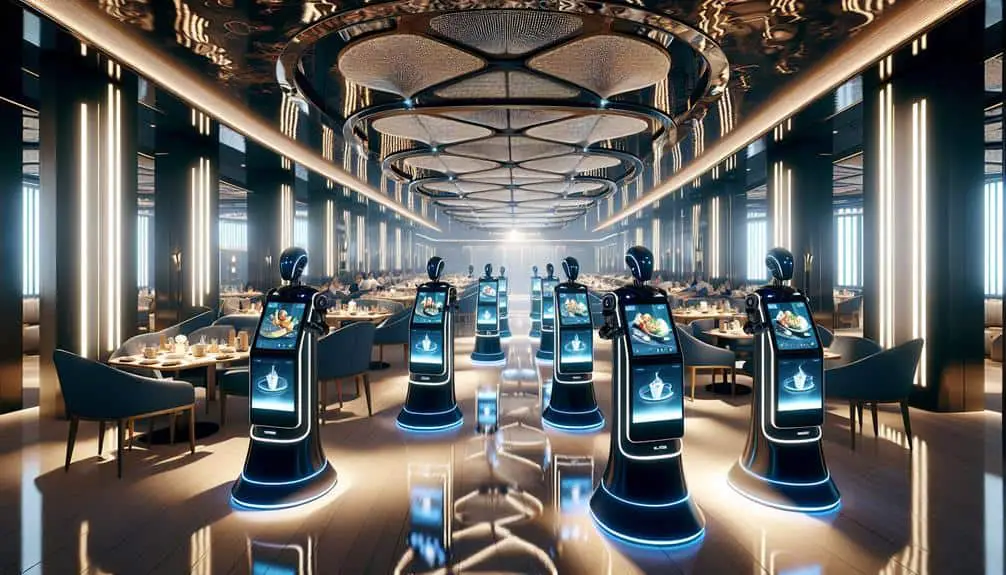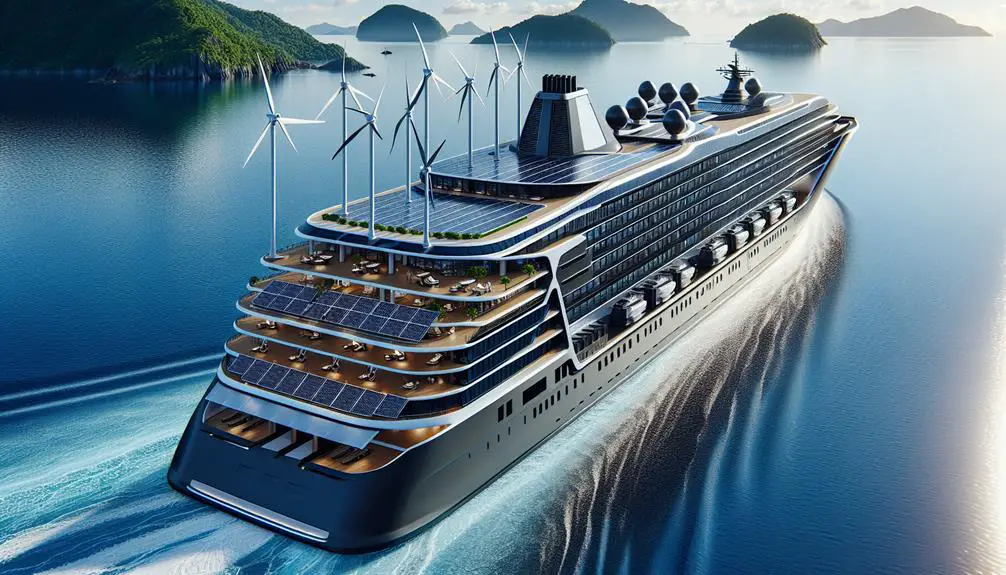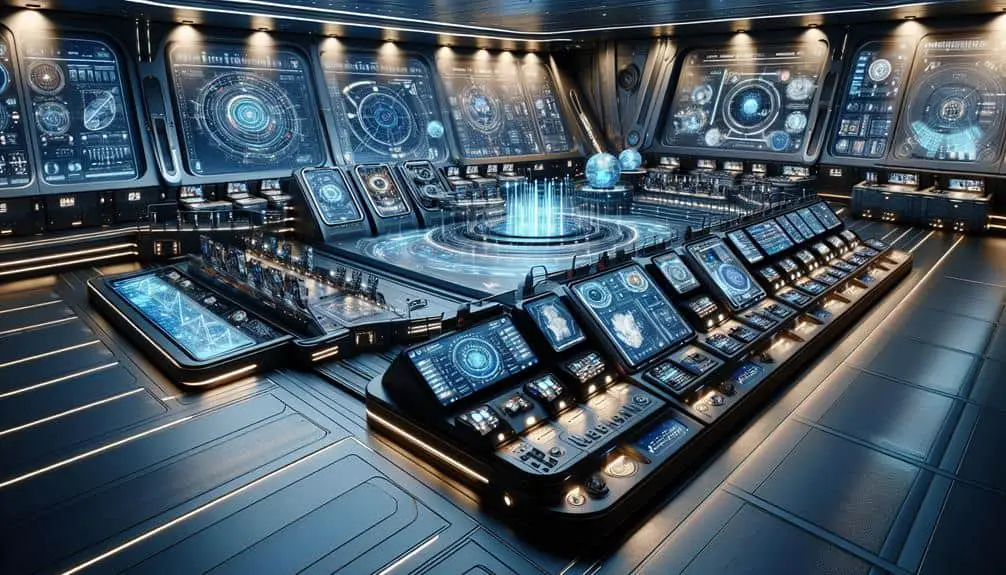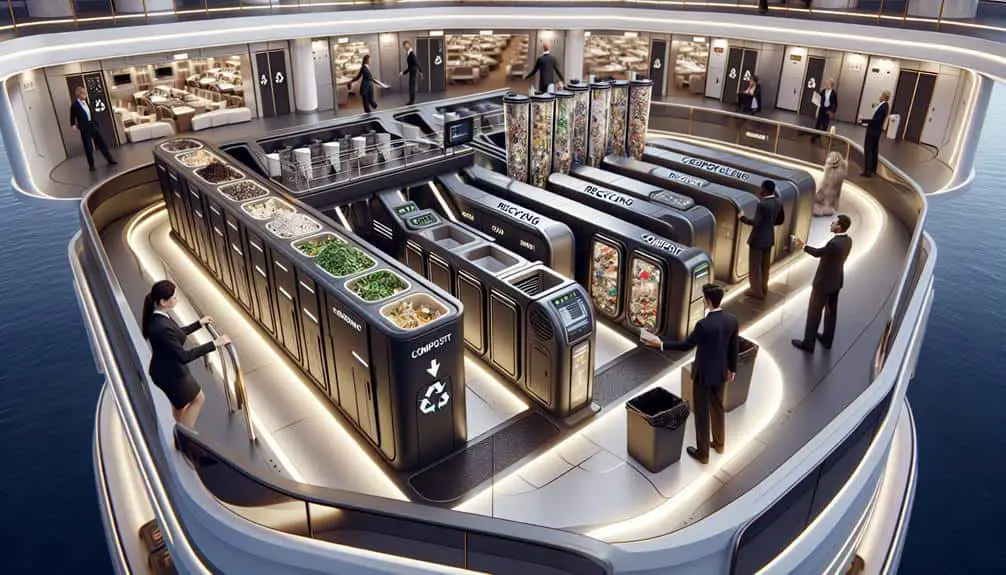Cruise ships are embracing restaurant automation to boost efficiency, optimize resources, and enhance guest dining experiences. By automating onboard restaurants, operations run smoother, wait times decrease, and errors are minimized. Personalized service, interactive menus, and innovative dining options all contribute to higher guest satisfaction. Integration with onboard technology offers convenience, personalized recommendations, and increased passenger engagement. The focus on efficiency, customization, and integration ultimately leads to a more seamless and enjoyable dining experience for guests. Discover how these advancements are revolutionizing the way cruise ship restaurants operate.
Key Points
- Enhances overall efficiency and streamlines operations for optimized resource allocation.
- Improves guest experience with personalized service, culinary innovation, and interactive menus.
- Increases food service productivity, reduces wait times, and minimizes human error.
- Enhances menu personalization, integrates interactive elements, and tailors dining choices.
- Integrates with onboard technology for convenience, engagement, and elevated customer satisfaction.
Benefits of Restaurant Automation
Embracing onboard restaurant automation can revolutionize the dining experience for both guests and staff, streamlining operations and enhancing overall efficiency. By implementing automated systems in restaurants on cruise ships, you can greatly increase profitability and improve workflow.
Automating restaurant tasks such as order processing, inventory management, and billing can lead to reduced errors, quicker service, and optimized resource allocation. This improved workflow translates into cost savings and increased profitability for the cruise ship operators. Additionally, automated systems can provide real-time data analytics, allowing staff to make data-driven decisions promptly.
Moreover, automation can enhance staff productivity by minimizing time spent on manual tasks and allowing them to focus on delivering exceptional service to guests. With streamlined operations, staff can work more efficiently, resulting in a smoother dining experience for guests. The integration of technology in restaurant operations not only benefits the bottom line but also enhances the overall dining experience on board.
Enhanced Guest Experience
For guests aboard cruise ships, an enhanced dining experience awaits through the seamless integration of onboard restaurant automation. Imagine a culinary journey where your preferences are remembered, and dishes tailored to your liking with precision and speed. This level of personalized service not only enhances guest satisfaction but also showcases the peak of culinary innovation.
Through onboard restaurant automation, guests can enjoy a seamless dining experience where technology enhances every aspect of their meal. From interactive menus that cater to individual dietary needs to robotic chefs that guarantee consistency in every dish prepared, the focus is solely on providing an unforgettable gastronomic adventure.
Moreover, the integration of automation allows for quicker service without compromising quality, ensuring that guests can savor their meals without unnecessary delays. This efficiency not only streamlines the dining process but also gives guests more time to indulge in the overall cruise experience, ultimately leading to heightened guest satisfaction levels.
In essence, onboard restaurant automation transforms dining into a symphony of flavors, where guest satisfaction harmonizes with culinary innovation to create a truly exceptional experience.
Efficiency in Food Service
Efficiency in food service aboard cruise ships is paramount to ensuring an exceptional dining experience for guests. By implementing streamlined operations and embracing onboard restaurant automation, cruise lines can greatly enhance their food service productivity. Through the use of advanced technology such as automated order processing systems and robotic kitchen assistants, the dining experience becomes more efficient and enjoyable for passengers.
Streamlined operations enable cruise ships to handle a high volume of food orders seamlessly, reducing wait times and ensuring that guests receive their meals promptly. Automation in food service also minimizes human error, leading to improved productivity and consistency in meal preparation and delivery. This not only benefits the guests by providing quick and accurate service but also allows the cruise staff to focus on other aspects of guest satisfaction.
Personalization and Customization
To elevate the dining experience even further aboard cruise ships, consider enhancing personalization and customization options for guests. Menu personalization can be taken to new heights by integrating interactive elements that allow passengers to tailor their dining choices to their preferences.
Imagine a digital menu where guests can select ingredients, cooking methods, and flavors to create a truly personalized dish. This level of culinary customization not only enhances the dining experience but also showcases innovation in onboard dining services.
Integration With Onboard Technology
Maximize your cruise ship dining experience by seamlessly integrating onboard technology to enhance convenience and engagement for passengers.
The seamless integration of advanced technology on cruise ships is revolutionizing the dining experience, offering passengers a more convenient and interactive way to enjoy their meals. By incorporating advanced technology such as interactive menus on tablets or smartphones, passengers can easily browse through a variety of dining options, place orders, and make reservations with just a few taps. This not only streamlines the ordering process but also allows for personalized recommendations based on individual preferences and dietary restrictions.
Moreover, onboard technology can enhance passenger engagement by providing interactive experiences such as virtual cooking classes, chef demonstrations, or even food and wine pairing tutorials. These immersive experiences not only entertain passengers but also educate them about different cuisines and culinary techniques. By seamlessly integrating advanced technology into the dining experience, cruise ships can elevate customer satisfaction levels and create memorable dining moments for their guests.
Frequently Asked Questions
How Do Cruise Ships Ensure the Safety and Quality of Food When Implementing Onboard Restaurant Automation?
Ensuring food safety and quality on cruise ships with onboard restaurant automation involves leveraging technology for meticulous quality control. By integrating automation, you can precisely monitor processes, uphold standards, and deliver exceptional dining experiences.
Are There Any Potential Drawbacks or Challenges Associated With Implementing Restaurant Automation on Cruise Ships?
When considering onboard restaurant automation on cruise ships, potential drawbacks and challenges may arise. You'll need to carefully balance customer experience and efficiency trade-offs while addressing training and maintenance challenges to make sure smooth operations.
How Do Cruise Ships Handle Dietary Restrictions and Special Requests With Automated Restaurant Systems?
Managing dietary needs on a cruise ship involves a blend of allergen management and culinary creativity. Automated systems streamline special meal accommodations, ensuring a smooth sailing for guests with dietary preferences. Your unique tastes are catered to seamlessly.
What Measures Are in Place to Ensure That Guests Still Receive Personalized and Attentive Service Despite the Use of Automation?
To guarantee personalized service despite automation integration, cruise ships utilize advanced algorithms to track guest preferences. By analyzing data such as dining history and feedback, the system tailors experiences, guaranteeing guests still receive attentive service.
How Do Cruise Lines Address Concerns About Job Displacement for Human Restaurant Staff Due to the Implementation of Automation Technology?
Addressing job displacement concerns, cruise lines prioritize job training for employees to adapt to automation. By investing in skill development, they guarantee employee retention and create a workforce equipped to handle advanced technology, enhancing service quality.




